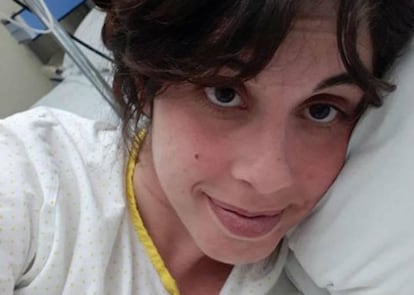Why a Facebook post about Spain’s public healthcare system went viral
Expectant mother Eva Castizo wrote that she wanted a symbolic invoice of all the services she had received, to highlight the importance of the country’s free healthcare

Eva Castizo was set to give birth to twins in less than 15 days. Due to the risk that the babies could come early, the young woman spent five days in Seville’s Hospital Virgen de Valme in January. “Until then, I had never had a problem that required a hospital stay of a few days,” she told Verne over the phone. “When I saw how much attention they were giving me, the service and the medicine, I asked myself, ‘How much does this all cost?’ And I wrote about it on Facebook.” The post, published on January 30, has since been shared more than 17,000 times and has received more than 7,600 comments.
I don’t think we’re aware of how lucky we are and why we must fight so that this system is not taken away from us Expectant mother Eva Castizo
Castizo wrote in the post that, after leaving hospital, she would have liked to have received a symbolic invoice of all the services she didn’t have to pay for. “I don’t think we’re aware of how lucky we are and why we must fight to ensure this system is not taken away from us,” the message read. Castizo then went on to list the number of tests, medical personnel and medicine involved in her treatment during her five-day stay at the hospital. “And all of this was just for me,” she adds.
Castizo’s post received more than 6,000 comments in the first week. “I did not expect the backlash and the number of people who misunderstood me,” she explains, referring to the hundreds of comments that pointed out that healthcare is not free. Others thought she was bragging about receiving services that were paid for with someone else’s money. Castizo, however, insists the post was a way to “give thanks for how I was treated and reiterate that we cannot let these services be taken away from us.”
Me han ingresado cinco días y al darme el alta, solo he recibido un papel en el que me explican las instrucciones que...
Posted by Eva Button on Wednesday, January 30, 2019
“There are those who say that I’m an immigrant and that they paid for my services with money they earned working,” she says. Healthcare in Spain is not covered by social security payments but by other levies such as sales tax (VAT) and personal income tax (known in Spain as IRPF). Anyone who makes a purchase in Spain is contributing to the country’s healthcare, whether or not they have a job.
How useful is the invoice?
Many of the comments on Castizo’s post debated whether such an invoice would really help raise awareness on the importance of public healthcare. This kind of bill is known as a “factura sombra” (shadow invoice) – it outlines the costs but it is not expected to be paid. During the last 20 years, such a scheme has been tested in Spanish regions such as Madrid, Andalusia, Galicia, Catalonia and Valencia, as a way to raise awareness. But it has only ever been used in specific cases. In Madrid, for example, the initiative was launched in 2011, and the first bill issued was for a cataract operation that cost €1,085.
The Facebook post has been shared more than 17,000 times and received more than 6,000 comments in less than a week
When Esperanza Aguirre, the former regional premier of Madrid from the conservative Popular Party (PP), announced the measure, the plan was to be trialed first at Madrid’s Hospital de La Paz and then extended to more public hospitals. But the measure, which was only used in 12 of the 37 public hospitals in the city, was eventually dissolved in 2017 by the new premier, Cristina Cifuentes, also of the PP. The invoice is still used in Andalusia and Valencia, but it is not provided in all hospitals and is only available for certain surgical procedures.
“This symbolic invoice will help us be aware of what we have in free public healthcare, and why we should fight for it,” explains Castizo.
Some European countries, such as Germany and Sweden, have a co-payment system where healthcare costs are split between the state and the citizen. An invoice breaking down the costs of the services is delivered to the patient’s home but, unlike in Spain, it includes a sum that must be paid by the patient.
Although symbolic invoices are uncommon in Spain, the approximate cost of some operations can be found online at a database created by the Spanish Network of Hospital Costs. This organization, however, believes such invoices are not positive. In an an interview with digital Spanish newspaper El Confidencial, lead researcher Francesc Cots explained that “telling someone, for example, that their chemotherapy cost €100,000 can create a feeling of guilt.”
English version by Asia London Palomba.
Tu suscripción se está usando en otro dispositivo
¿Quieres añadir otro usuario a tu suscripción?
Si continúas leyendo en este dispositivo, no se podrá leer en el otro.
FlechaTu suscripción se está usando en otro dispositivo y solo puedes acceder a EL PAÍS desde un dispositivo a la vez.
Si quieres compartir tu cuenta, cambia tu suscripción a la modalidad Premium, así podrás añadir otro usuario. Cada uno accederá con su propia cuenta de email, lo que os permitirá personalizar vuestra experiencia en EL PAÍS.
¿Tienes una suscripción de empresa? Accede aquí para contratar más cuentas.
En el caso de no saber quién está usando tu cuenta, te recomendamos cambiar tu contraseña aquí.
Si decides continuar compartiendo tu cuenta, este mensaje se mostrará en tu dispositivo y en el de la otra persona que está usando tu cuenta de forma indefinida, afectando a tu experiencia de lectura. Puedes consultar aquí los términos y condiciones de la suscripción digital.









































